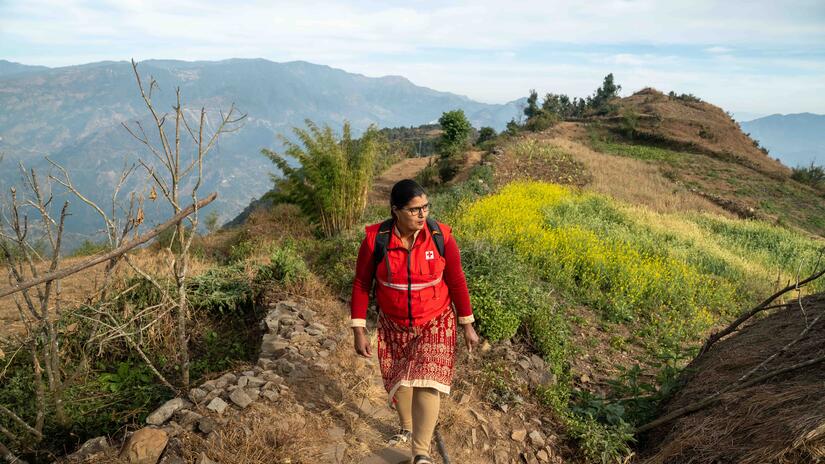Part 1 in a series of stories for World Water Day: Friday 22 March.
By Shriluna Shrestha and Rachel Punitha
For Nepal Red Cross volunteer Muna, the steep, winding paths of rural Nepal have become somewhat of a regular commute. She treks to remote areas to educate communities, particularly women and children, about hygiene and sanitation practices that can keep them safe from communicable diseases.
“Even though it takes me around four to five hours of walking to reach the school at the top of the hill, this doesn’t trouble me,” she says. “All my weariness fades away when I finally meet the children and the community."
Muna’s health and hygiene sessions for schoolchildren, adolescents and mothers’ groups focus on handwashing, personal and menstrual hygiene, and community sanitation.
She extends her impact by training female community health volunteers, appointed by the government, who then play a crucial role in delivering health and hygiene sessions in their own communities.
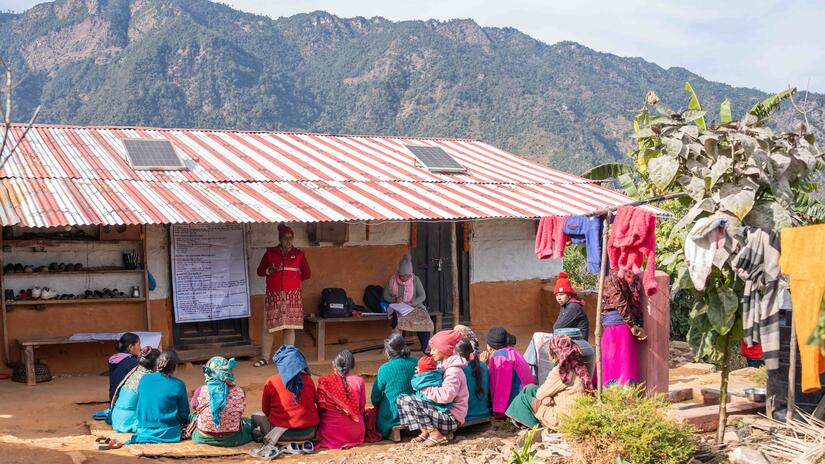
Nepal Red Cross volunteer Muna demonstrates proper handwashing steps to school children gathered at a local school.
Photo: Merit Maharjan/IFRC
One of those women community health volunteers is Indira.
“In the session, we educate mothers about health and hygiene practices and thoroughly discuss their health-related issues,” Indira says. “They are curious and practicing what they have learned.”
“The training helped me enhance my skills, and I learned to deliver the session to diverse groups,” she adds.
In the early stages of the project, Muna and the Nepal Red Cross team faced significant challenges. It took a lot of work to convince local people to alter their hygiene and sanitation practices.
But the Red Cross team made continuous efforts to build trust. They enrolled local-level authorities, formed community-based committees and organized activities to engage people and get their input.
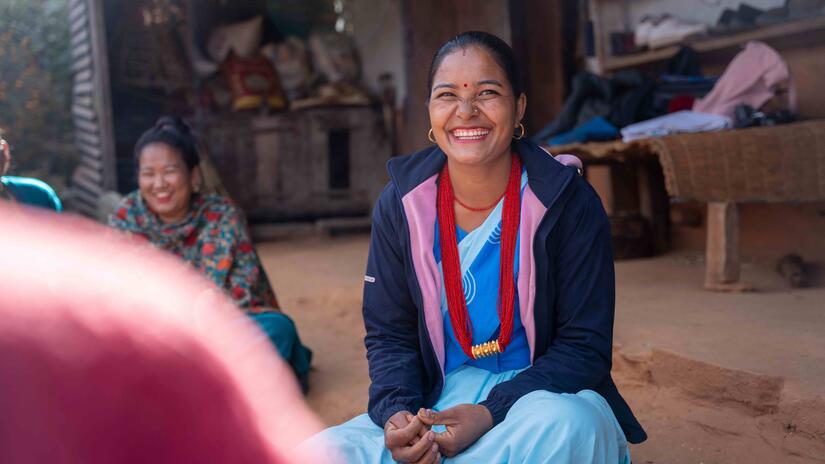
There are many smiles and laughs as Indira, pictured here, leads the team of women community health volunteers through a discussion about health and hygiene.
Photo: Merit Maharjan/IFRC
Their efforts yielded positive results. Once-reluctant communities have now become enthusiastic supporters.
“I enjoy participating in community and health sessions conducted as part of this initiative,” says Nirmaya, one of the participants. “Such gatherings bring women together, providing a platform for sharing experiences and mutual learning.
“For us, these sessions are like a respite from household responsibilities. It allows us to engage in insightful discussions on various health and hygiene topics."
“A simple change in health habits can lead to a healthy life. That’s my biggest learning from the sessions.”
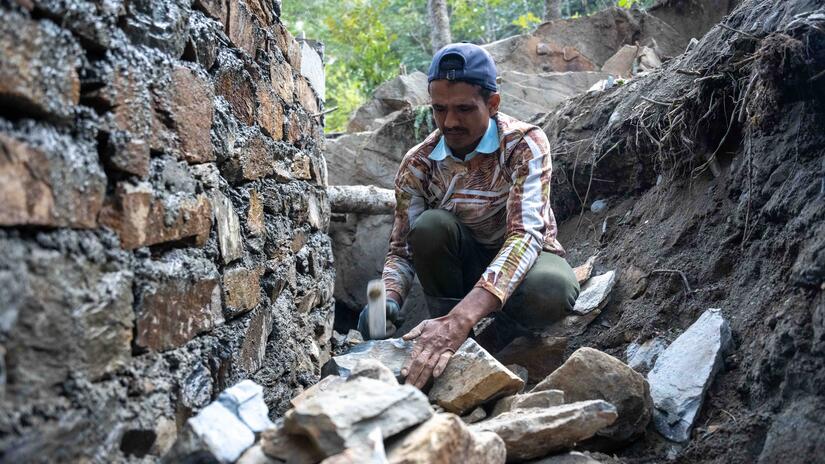
In one village, this man uses a hammer to shape rocks that will be used to build the wall of a water basin at a new water distribution point in rural eastern Nepal.
Photo: Merit Maharjan/IFRC
One house, one tap
As Muna and her team focus on hygiene and behavioral changes, the water, sanitation and hygiene (WASH) team of the Nepal Red Cross takes charge of another vital component of the program—ensuring access to clean drinking water for every household in the district.
Aligned with the government’s “Ek dhara, ek ghar” campaign — which translates to “one house, one tap” — the Nepal Red Cross, IFRC, British Red Cross, Finnish Red Cross and Hong Kong Red Cross each play a role in supporting the initiative.
In short, here’s how it works. The Nepal Red Cross works with local authorities and the community through a co-funding approach. The IFRC contributes 60 per cent of the investment for materials such as pipelines, taps and cement and it offers technical assistance and trainings to enhance the skills needed to complete the project.
The remaining 20 per cent of financial support is from local authorities, while the other 20 per cent is sourced from the communities through labor contributions and maintenance efforts.
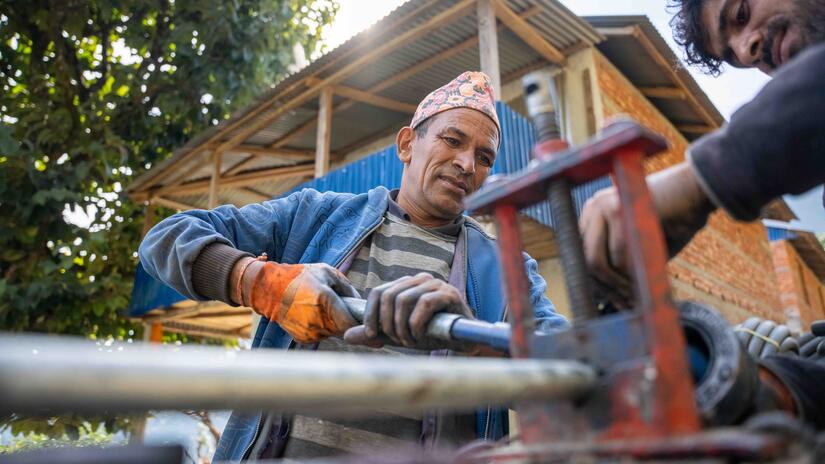
Two members of the local community install pipes as part of the final installation of a new well, water collection basin and distribution point in their remote, rural Nepali village.
Photo: Merit Maharjan/IFRC
As of now, more than 250 households within the Okhaldhunga district have access to outdoor running taps, eliminating the need for women and children to go on lengthy walks to fetch water.
A growing impact
These water, sanitation and hygiene projects in Nepal have been implemented in three districts—Okhaldhunga, Ramechhap, and Sindhuli — in the eastern part of the country. Here are the results so far:
• Over 9,000 people in the districts benefit from health and hygiene sessions.
• More than 700 households now have access to drinking water.
• Six schools, two health posts, and one local authority office have water stations on their premises.
• 37 people, including eight female participants, have received skill development training on plumbing and maintenance.
“Easy access to water has improved our daily lives, saving us time previously spent on fetching water,” says Jeena, a community member who built one of the water taps with support from the Nepal Red Cross. “Now, we can efficiently use water to cultivate vegetables in our backyard and maintain a cleaner environment and better hygiene.”
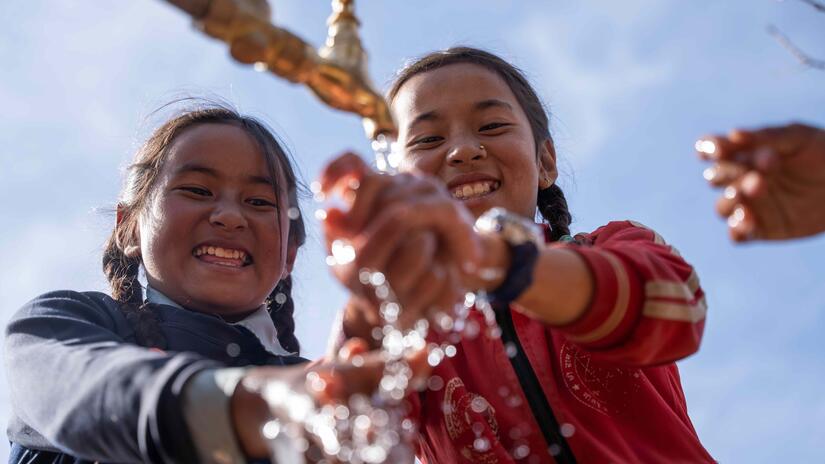
Two young children smile and laugh as they wash their hands in a newly built water tap in their village in rural Nepal.
Photo: Merit Maharjan/IFRC

